#cultural critic
Text
youtube
Jordan Peterson: The radical Left is guilt-tripping the West into oblivion.
What a breath of fresh air. Thank you Telegraph for giving Jordan Peterson an honest interview. Such a real change.
#Jordan Peterson#Canadian psychologist#Psychology#Clinical psychology#Self-help#Author#Professor#Lecturer#Public speaker#Cultural critic#Social issues#Political commentary#Free speech advocate#Gender issues#Identity politics#Intellectual discussions#today on tumblr#youtube#youtube video#the telegraph#Youtube
0 notes
Text
You know, it's rather interesting to me that Taylor Swift's parasocial relationship with her fans is honestly more akin to a YouTuber than a writer's. When I scroll through her tag on tumblr/Twitter, it's far more regarding the connection to her personal life/relationship developments than the actual metaphors/fictional story she might be telling. Everything comes back to how her songs reflect back on her relationships with Joe/Matty/Travis/Jake/insert ex-boyfriend here. And what fascinates me about it is that even though she complains about it, she leans into that very perception because it strengthens the parasocial bond.
The marketing for TTPD so clearly being about Joe Alwyn and the songs to Matty Healy. The marketing/video for Red TV so CLEARLY being about Jake Gyllenhaal, with so many of the new lines in All Too Well specifically being digs at him (I'll get older but your lovers stay my age, casting an actor that looks like him for the video, specific lines in I Bet You Think About Me). The fact that songs like Getaway Car and Bejeweled and Gorgeous and London Boy and Lavender Haze being picked apart at time of release and long after for signs of relationships crumbling. The way she uses surprise songs in relation to her relationship development with Joe/Matty/Travis. The damn TTPD "stages of grief" playlists where she deliberately undid/changed the meanings of old songs just to keep her audience speculating on her love life.
It's not sexist to point out that her wielding her love life is a marketing tool and that the strongest connection to her audience isn't the strength of her writing/the composition of her music- it's her deliberate crafting of a connection between her music and her personal life, leaving the audience invested in her music as an extension of Taylor the Person/Girlfriend rather than Taylor the Artist.
#taylor swift#anti taylor swift#to an extent#i honestly just view this as an analysis of her marketing strategy#like hates off to her for being the best possible microcosm of parasocial capitalism#girlie really knew how to harness the teen girl market and good for her billionaire self#she knows how to exploit the very tabloid culture that once strangled her#how to become the tabloid itself#and wield that against ex-boyfriends too but you didn’t hear that from me#joe alwyn#matty healy#travis kelce#taylor swift critical#ttpd#red tv#i bet you think about me#getaway car#bejeweled#gorgeous#london boy#lavender haze
957 notes
·
View notes
Text
I also heavily resent the ever-present implication in mainstream media that at all touches on trauma that we cannot have any sympathy for Bad Victims. That it's evil to write a sympathetic Bad Victim. Hell, that it's bad to portray one at all at times. Writing a victim of trauma who's an addict or self-destructive is already an edge case-- writing trauma survivors who end up actually hurting someone else, being chronically "treatment"-resistant or having inconvenient ptsd, perpetuate the cycle, or are just kind of a total dick is considered an evil move. Instead of like. An actually complex and interesting artistic choice.
Idk. It pisses me off a lot how often Bad Victims[TM] are brushed under the rug and if you dare to speak of them/make art of them, let alone SYMPATHIZE with them you're an irredeemable monster. And that's just fictional characters. Don't even get me started on the way people treat actual people who have ptsd in a way that's at all inconvenient and problematic in their opinion.
#bad victims#trauma#purity culture#cultural christianity#cycle of abuse#the invisible victims#trauma survivor#ptsd#purity wank#freedom of expression#dark topics#media criticism#trauma in media#please can i get one traumatized blorbo that isnt purity poisoned#like you're not writing a moral guidebook for small children. you're allowed to write anything at all forever
2K notes
·
View notes
Text
tools not rules: the importance of critical thinking
More than once, I’ve talked about the negative implications of Evangelical/purity culture logic being uncritically replicated in fandom spaces and left-wing discourse, and have also referenced specific examples of logical overlap this produces re, in particular, the policing of sexuality. What I don’t think I’ve done before is explain how this happens: how even a well-intentioned person who’s trying to unlearn the toxic systems they grew up with can end up replicating those systems. Even if you didn’t grow up specifically in an Evangelical/purity context, if your home, school, work and/or other social environments have never encouraged or taught you to think critically, then it’s easy to fall into similar traps - so here, hopefully, is a quick explainer on how that works, and (hopefully) how to avoid it in the future.
Put simply: within Evangelism, purity culture and other strict, hierarchical social contexts, an enormous value is placed on rules, and specifically hard rules. There might be a little wiggle-room in some instances, but overwhelmingly, the rules are fixed: once you get taught that something is bad, you’re expected never to question it. Understanding the rules is secondary to obeying them, and oftentimes, asking for a more thorough explanation - no matter how innocently, even if all you’re trying to do is learn - is framed as challenging those rules, and therefore cast as disobedience. And where obedience is a virtue, disobedience is a sin. If someone breaks the rules, it doesn’t matter why they did it, only that they did. Their explanations or justifications don’t matter, and nor does the context: a rule is a rule, and rulebreakers are Bad.
In this kind of environment, therefore, you absorb three main lessons: one, to obey a rule from the moment you learn it; two, that it’s more important to follow the rules than to understand them; and three, that enforcing the rules means castigating anyone who breaks them. And these lessons go deep: they’re hard to unlearn, especially when you grow up with them through your formative years, because the consequences of breaking them - or even being seen to break them - can be socially catastrophic.
But outside these sorts of strict environments - and, honestly, even within them - that much rigidity isn’t healthy. Life is frequently far more complex and nuanced than hard rules really allow for, particularly when it comes to human psychology and behaviour - and this is where critical thinking comes in. Critical thinking allows us to evaluate the world around us on an ongoing basis: to weigh the merits of different positions; to challenge established rules if we feel they no longer serve us; to decide which new ones to institute in their place; to acknowledge that sometimes, there are no easy answers; to show the working behind our positions, and to assess the logic with which other arguments are presented to us. Critical thinking is how we graduate from a simplistic, black-and-white view of morality to a more nuanced perception of the world - but this is a very hard lesson to learn if, instead of critical thinking, we’re taught instead to put our faith in rules alone.
So: what does it actually look like, when rule-based logic is applied in left-wing spaces? I’ll give you an example:
Sally is new to both social justice and fandom. She grew up in a household that punished her for asking questions, and where she was expected to unquestioningly follow specific hard rules. Now, though, Sally has started to learn a bit more about the world outside her immediate bubble, and is realising not only that the rules she grew up with were toxic, but that she’s absorbed a lot of biases she doesn’t want to have. Sally is keen to improve herself. She wants to be a good person! So Sally joins some internet communities and starts to read up on things. Sally is well-intentioned, but she’s also never learned how to evaluate information before, and she’s certainly never had to consider that two contrasting opinions could be equally valid - how could she have, when she wasn’t allowed to ask questions, and when she was always told there was a singular Right Answer to everything? Her whole framework for learning is to Look For The Rules And Follow Them, and now that she’s learned the old rules were Bad, that means she has to figure out what the Good Rules are.
Sally isn’t aware she’s thinking of it in these terms, but subconsciously, this is how she’s learned to think. So when Sally reads a post explaining how sex work and pornography are inherently misogynistic and demeaning to women, Sally doesn’t consider this as one side of an ongoing argument, but uncritically absorbs this information as a new Rule. She reads about how it’s always bad and appropriative for someone from one culture to wear clothes from another culture, and even though she’s not quite sure of all the ways in which it applies, this becomes a Rule, too. Whatever argument she encounters first that seems reasonable becomes a Rule, and once she has the Rules, there’s no need to challenge them or research them or flesh out her understanding, because that’s never been how Rules work - and because she’s grown up in a context where the foremost way to show that you’re aware of and obeying the Rules is to shame people for breaking them, even though she’s not well-versed in these subjects, Sally begins to weigh in on debates by harshly disagreeing with anyone who offers up counter-opinions. Sometimes her disagreements are couched in borrowed terms, parroting back the logic of the Rules she’s learned, but other times, they’re simply ad hominem attacks, because at home, breaking a Rule makes you a bad person, and as such, Sally has never learned to differentiate between attacking the idea and attacking the person.
And of course, because Sally doesn’t understand the Rules in-depth, it’s harder to explain them to or debate with rulebreakers who’ve come armed with arguments she hasn’t heard before, which makes it easier and less frustrating to just insult them and point out that they ARE rulebreakers - especially if she doesn’t want to admit her confusion or the limitations of her knowledge. Most crucially of all, Sally doesn’t have a viable framework for admitting to fault or ignorance beyond a total groveling apology that doubles as a concession to having been Morally Bad, because that’s what it’s always meant to her to admit you broke a Rule. She has no template for saying, “huh, I hadn’t considered that,” or “I don’t know enough to contribute here,” or even “I was wrong; thanks for explaining!”
So instead, when challenged, Sally remains defensive: she feels guilty about the prospect of being Bad, because she absolutely doesn’t want to be a Bad Person, but she also doesn’t know how to conceptualise goodness outside of obedience. It makes her nervous and unsettled to think that strangers could think of her as a Bad Person when she’s following the Rules, and so she becomes even more aggressive when challenged to compensate, clinging all the more tightly to anyone who agrees with her, yet inevitably ending up hurt when it turns out this person or that who she thought agreed on What The Rules Were suddenly develops a different opinion, or asks a question, or does something else unsettling.
Pushed to this sort of breaking point, some people in Sally’s position go back to the fundamentalism they were raised with, not because they still agree with it, but because the lack of uniform agreement about What The Rules Are makes them feel constantly anxious and attacked, and at least before, they knew how to behave to ensure that everyone around them knew they were Good. Others turn to increasingly niche communities and social groups, constantly on paranoid alert for Deviance From The Rules. But other people eventually have the freeing realisation that the fixation on Rules and Goodness is what’s hurting them, not strangers with different opinions, and they steadily start to do what they wanted to do all along: become happier, kinder and better-informed people who can admit to human failings - including their own - without melting down about it.
THIS is what we mean when we talk about puritan logic being present in fandom and left-wing spaces: the refusal to engage with critical thinking while sticking doggedly to a single, fixed interpretation of How To Be Good. It’s not always about sexuality; it’s just that sexuality, and especially queerness, are topics we’re used to seeing conservatives talk about a certain way, and when those same rhetorical tricks show up in our fandom spaces, we know why they look familiar.
So: how do you break out of rule-based thinking? By being aware of it as a behavioural pattern. By making a conscious effort to accept that differing perspectives can sometimes have equal value, or that, even if a given argument isn’t completely sound, it might still contain a nugget of truth. By trying to be less reactive and more reflective when encountering positions different to your own. By accepting that not every argument is automatically tied to or indicative of a higher moral position: sometimes, we’re just talking about stuff! By remembering that you’re allowed to change your position, or challenge someone else’s, or ask for clarification. By understanding that having a moral code and personal principles isn’t at odds with asking questions, and that it’s possible - even desirable - to update your beliefs when you come to learn more than you did before.
This can be a scary and disquieting process to engage in, and it’s important to be aware of that, because one of the main appeals of rule-based thinking - if not the key appeal - is the comfort of moral certainty it engenders. If the rules are simple and clear, and following them is what makes you a good person, then it’s easy to know if you’re doing the right thing according to that system. It’s much, much harder and frequently more uncomfortable to be uncertain about things: to doubt, not only yourself, but the way you’ve been taught to think. And especially online, where we encounter so many more opinions and people than we might elsewhere, and where we can get dogpiled on by strangers or go viral without meaning to despite our best intentions? The prospect of being deemed Bad is genuinely terrifying. Of course we want to follow the Rules. But that’s the point of critical thinking: to try and understand that rules exist in the first place, not to be immutable and unchanging, but as tools to help us be better - and if a tool becomes defunct or broken, it only makes sense to repair it.
Rigid thinking teaches us to view the world through the lens of rules: to obey first and understand later. Critical thinking teaches us to use ideas, questions, contexts and other bits of information as analytic tools: to put understanding ahead of obedience. So if you want to break out of puritan thinking, whenever you encounter a new piece of information, ask yourself: are you absorbing it as a rule, or as a tool?
10K notes
·
View notes
Text
wow almost seems like this whole romanticization of "girlhood" thing kind of revolves entirely around consumerisim. "little treats". 10 step skincare regimens. "girl math" as an excuse to be financially illiterate. be a good girl, don't think, just spend inordinate amts of money to conform to the latest tiktok microtrend bc that's all it means to be a girl <3
#cultural critique#cultural criticism#romanticization#girlblogging#gaslight gatekeep girlboss#girl math#little treat#tiktok trend#feminism#anti beauty industry#anti beauty culture
2K notes
·
View notes
Text



nature is healing
#radfem#anti beauty culture#anti beauty industry#radical feminism#radblr#radical feminists please touch#radical feminists do interact#radfem safe#gender critical#gc feminism#feminism#anti beauty standards#anti anti aging#pro aging
440 notes
·
View notes
Text
What's the point of having characters from different time periods when they behave and swear like they're edgy american teens?
#it would've been charming if their speech reflected their cultures#too bad vivziepop is stuck in her middle school years#vivziepop critical#hazbin critical#hazbin hotel critical#hazbin hotel criticism#hazbin critique#hazbin criticism#hazbin hotel critique#vivziepop criticism
1K notes
·
View notes
Text
Transgender-ideology in fandom culture
cw might be an incredibly incoherent niche rant idrc
I'm not sure if it's just me, but I can't be the only person who is somewhat involved in fandom elsewhere and noticing the eventual decline of tomboy-ish girls and masculine women be normalised.
I believe there's a certain pattern popping up among fandom spaces online perpetuating as the result of popularised terms such as 'T4T' (Transgender for transgender.)
Bear with me, but take 2 female characters who are romantically involved with each other. People on the left engrossed in fandom culture will start to interpret the more masculine of the two as trans-masc or the other way around (The more feminine individual progressively starts being labeled as trans-fem...)
It's disheartening seeing all the women I love from different media being interpreted with top surgery scars and being translated to either fit 'trans-masculine or trans-feminine' identities. Like... can women no longer be gnc anymore... Do we seriously need to start classifying them as men-adjacent..?
It's like we're winding the clock a couple decades back. People are questioning the authenticity of female homosexual relationships, just because there is no male present.
AND if you were to mildly express your dislike for a specific headcanon relating to gender identity, people would be quick to label you as a bigot or transphobe.. yawn..
#gender critical#lgb drop the t#terfism#terfblr#terfsafe#radical feminism#radblr#trans ideology#fandom culture#fandom problems
962 notes
·
View notes
Text
The real-world impact of Lore Olympus
i.e. do your research Rachel
Trigger warning: racism, fetishization, appropriation, mentions of SA
Long post ahead
A while ago, someone told me that Lore Olympus was just a silly little comic written out of boredom. That it was made to be "funny". They told me that "[I] can't hope [for] an extremely [well-written] story when it was just made with the intention to make something goofy" and that if Rachel actually wanted to make something serious like I had, she would write a book and not a comic.
At the time of this exchange, it was past 1 a.m. and I was exhausted. I did not want to argue with this person and it simply wasn't worth my time or energy in the moment.
But looking back at that (mostly one-sided) interaction, I can't help but think that there is so much wrong with that point of view. Of course, everyone is entitled to their opinion about Lore Olympus, whether good or bad. But Lore Olympus isn't just some silly little nothing comic about nothing important. It is a comic that actively appropriates and erases Greek Culture. It is a comic that has no respect for the actual stories that have been passed down over thousands of years whether by word of mouth or written text. It is a comic that perpetuates a false narrative and harmful stereotypes about characters or certain groups of people. So, no, it's not just a silly little comic.
Incorrect information
Here’s an example of what I mean:
When I was doing research for my post about the 10 year time skip, I looked up Leuce to reconfirm the little information I knew about her. Wanna guess the first thing that popped up about her?
A Lore Olympus Wiki article.
Okay. How about Minthe? Hundreds of pictures of her from Lore Olympus and a LO Wiki article as one of the top 3 results. Both character are horribly represented in LO and unfortunately there isn’t really any documented stories or records that can refute how LO paints them. Because of this, other characters in Greek Mythology like Leuce and Minthe, whose stories have little to no documentation, stand to suffer the most harm from deliberate misrepresentation on Rachel’s part.
Of course well-known and better documented figures in Greek mythology face slander as well. What about Thetis or Leto? How about Apollo? All of their portrayals in LO are HORRIBLE. I have seen people online absolutely drag them to filth not because they're upset about how the character is portrayed compared to their mythological counterpart, but because they have no knowledge of how they are actually portrayed outside of LO. They just assume that's how the characters are. Similarly, people who have either very little or no prior knowledge of Greek Mythology and Culture would look at the comic and go "Yep, sounds legit. It must be true." and go about thinking that what is portrayed in LO is accurate to what was transcribed thousands of years ago.
Creative interpretations and racism/fetishization within LO
Don’t get me wrong. Creative interpretations and artistic liberties can be great. When they’re done tastefully. I personally think if done correctly, a Greek myth spun in a modern way has the potential be very good. But that's not what we were given.
Characters like Minthe, Leuce, and Thetis (all nymphs btw) are portrayed as trashy tramps who put out and are used as a foil sabotage Persephone and/or her relationship with Hades. Compare that to Greek Mythology where in the Iliad, Thetis is very well-respected by the gods, particularly Hera. Unfortunately, other similar characters like satrys (and basically any character that isn’t a god) are usually portrayed as a low-class POC that can be easily exploited, manipulated, or used as a temporary villain/lover/pawn to “get back” at Persephone, our white-coded protagonist who can do no wrong.
Additionally, there is a clear race/class bias against characters like nymphs in LO. We see many cases scattered throughout the comic of gods like Hera or Aphrodite referring to nymphs as "trash" or "low class" or the idea that nymphs do not belong with gods being heavily implied if not outright said. I cannot tell you how often I've seen Minthe be called some variant of "cheap" by the readers of LO. Even Persephone (who created the flower nymphs) treats them with such disrespect. She frequently calls them some variant of "stupid" or "simple" like saying how they're not the sharpest crayons in the box even though she's the one WHO MADE THEM. However, it's so odd not really to note that nymphs like Echo, Amphitrite, or Psyche (who was previously disguised as a nymph) are not discriminated against. This is because they are liked or trusted by the gods they are around and ergo are often portrayed as the "good ones", which is a disgusting mindset to have.
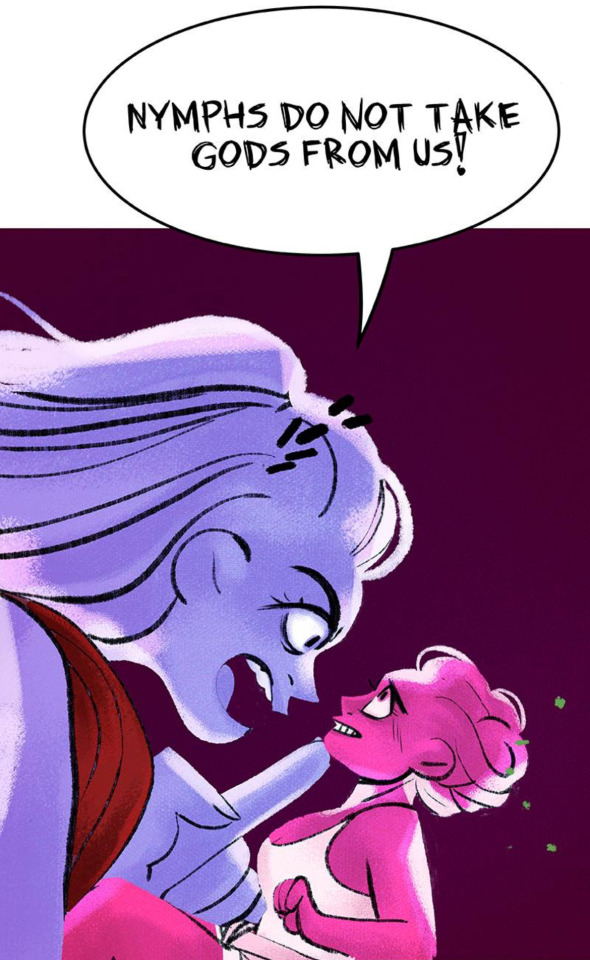
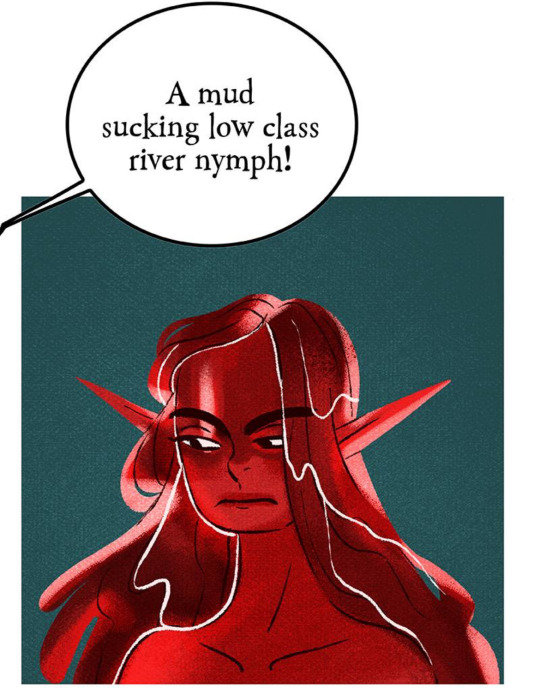
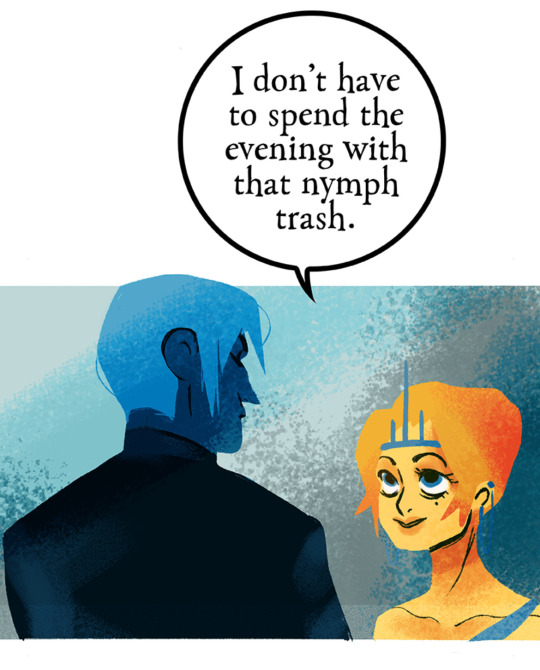
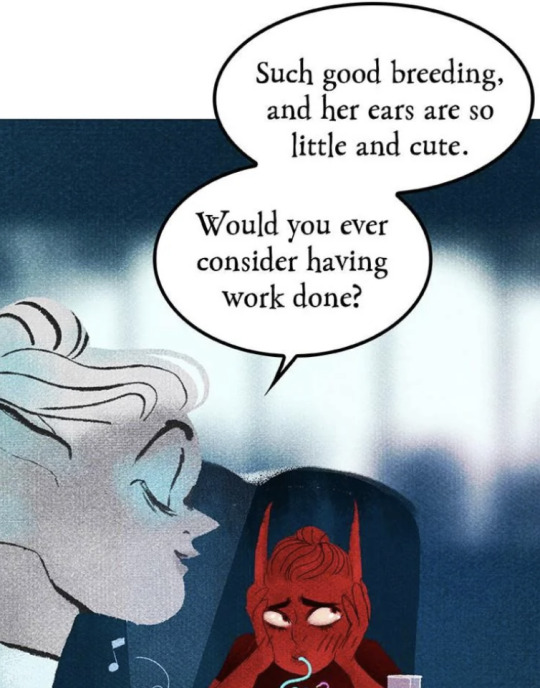
We also see the fetishization of nymphs in the comic that is disturbingly similar to the fetishization of women who are Black, Asian, or Latina. It is a known fact that Hades has a flower nymph fetish. Not only is this implied in the comic, but Rachel stated it outright in an old Patreon post. Nymphs are also generally treated as sex-symbols, disposable, and as a lesser-than. Zeus frequently displays this behavior by abandoning nymphs he knocked up in the mortal realm.
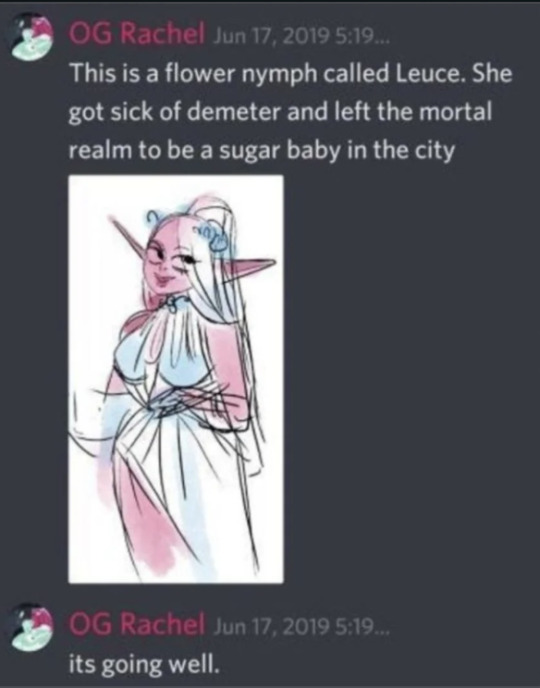
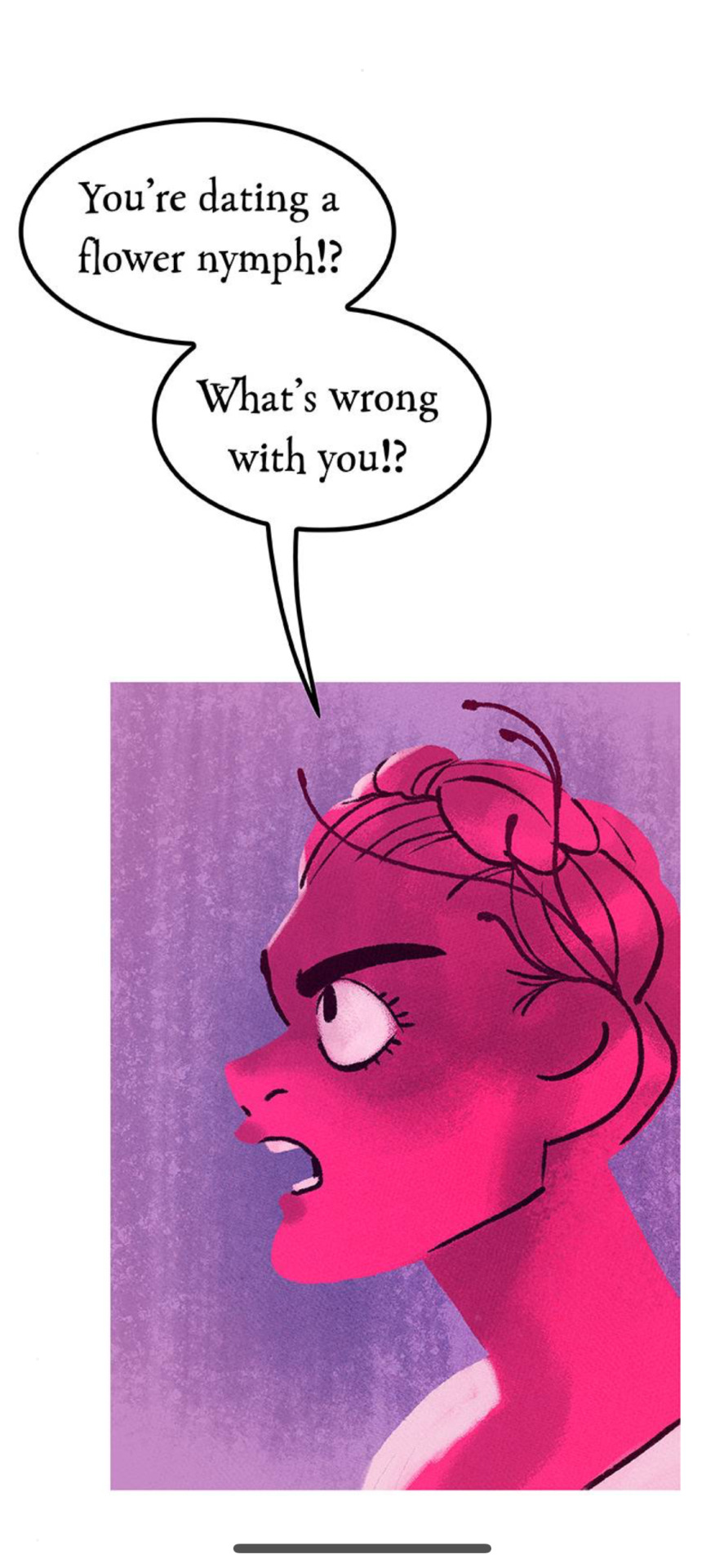
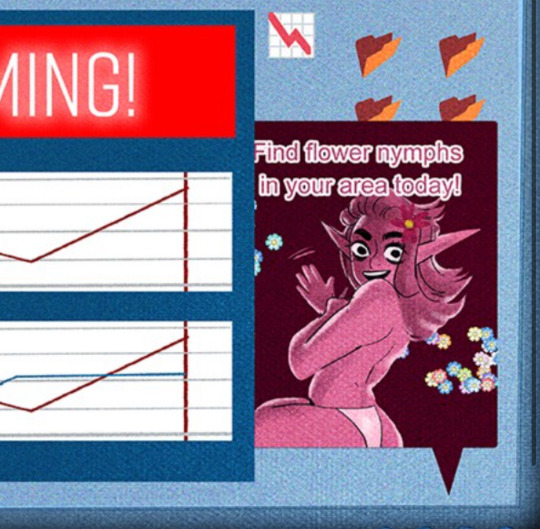
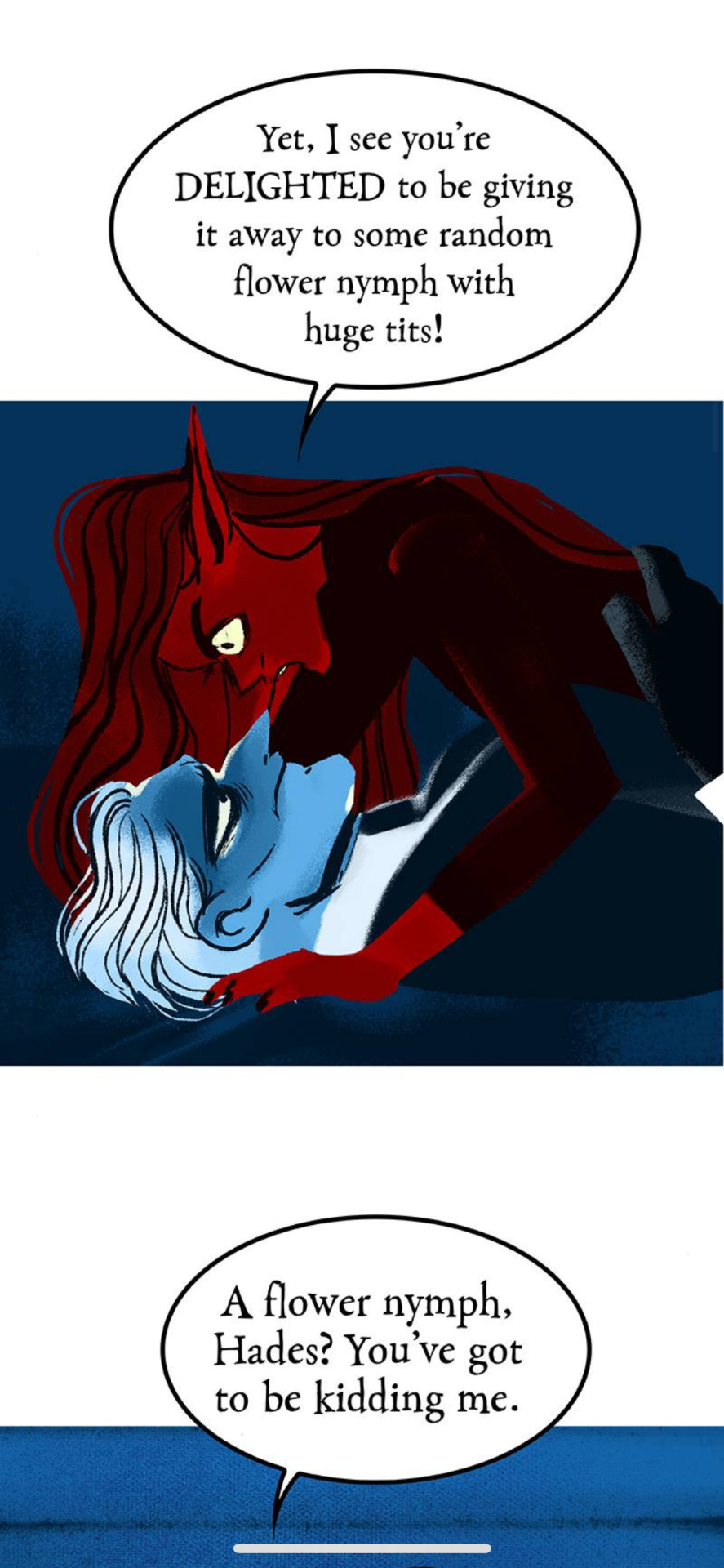
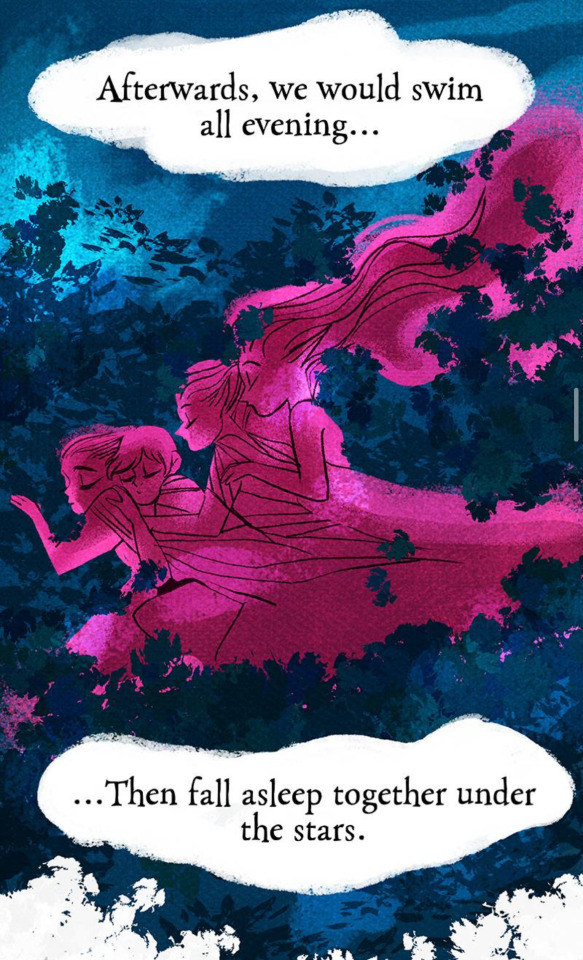
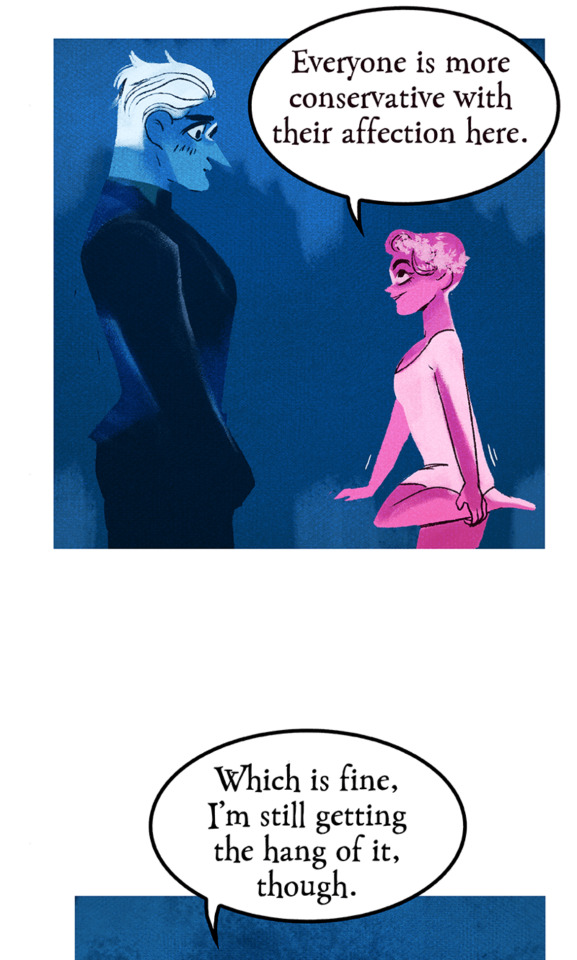
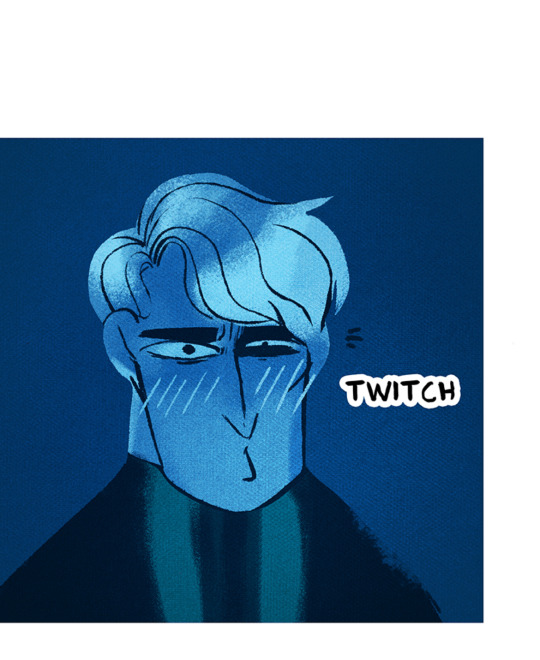
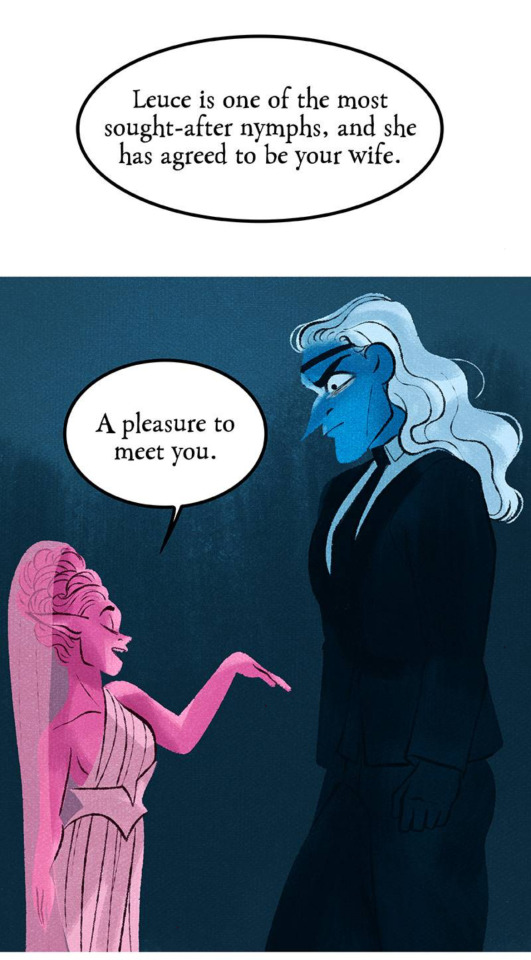
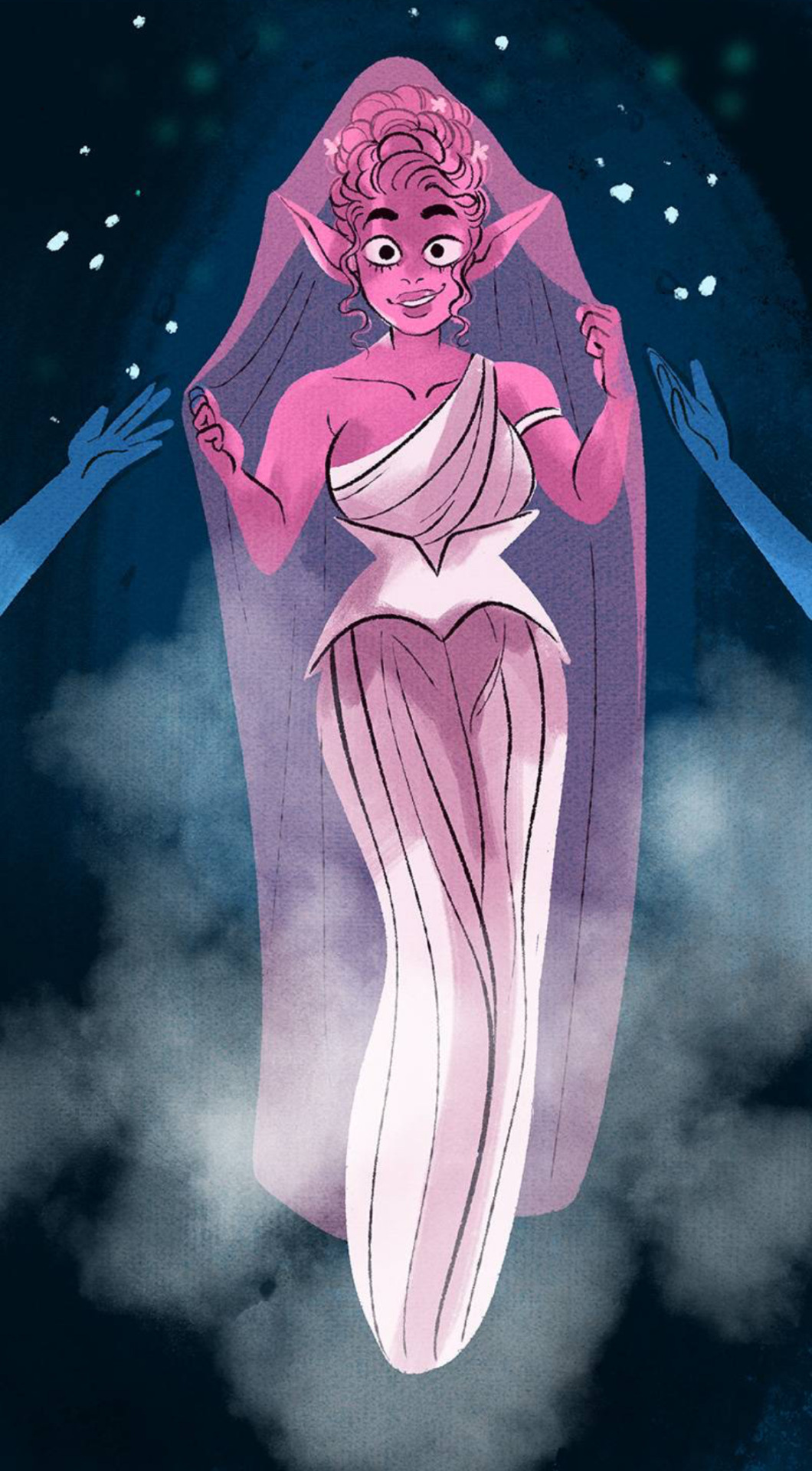
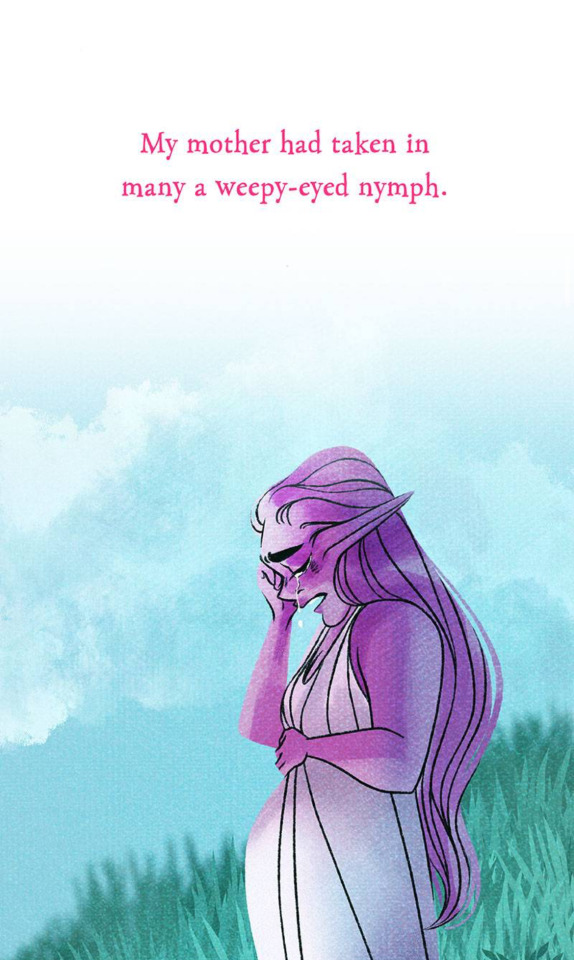
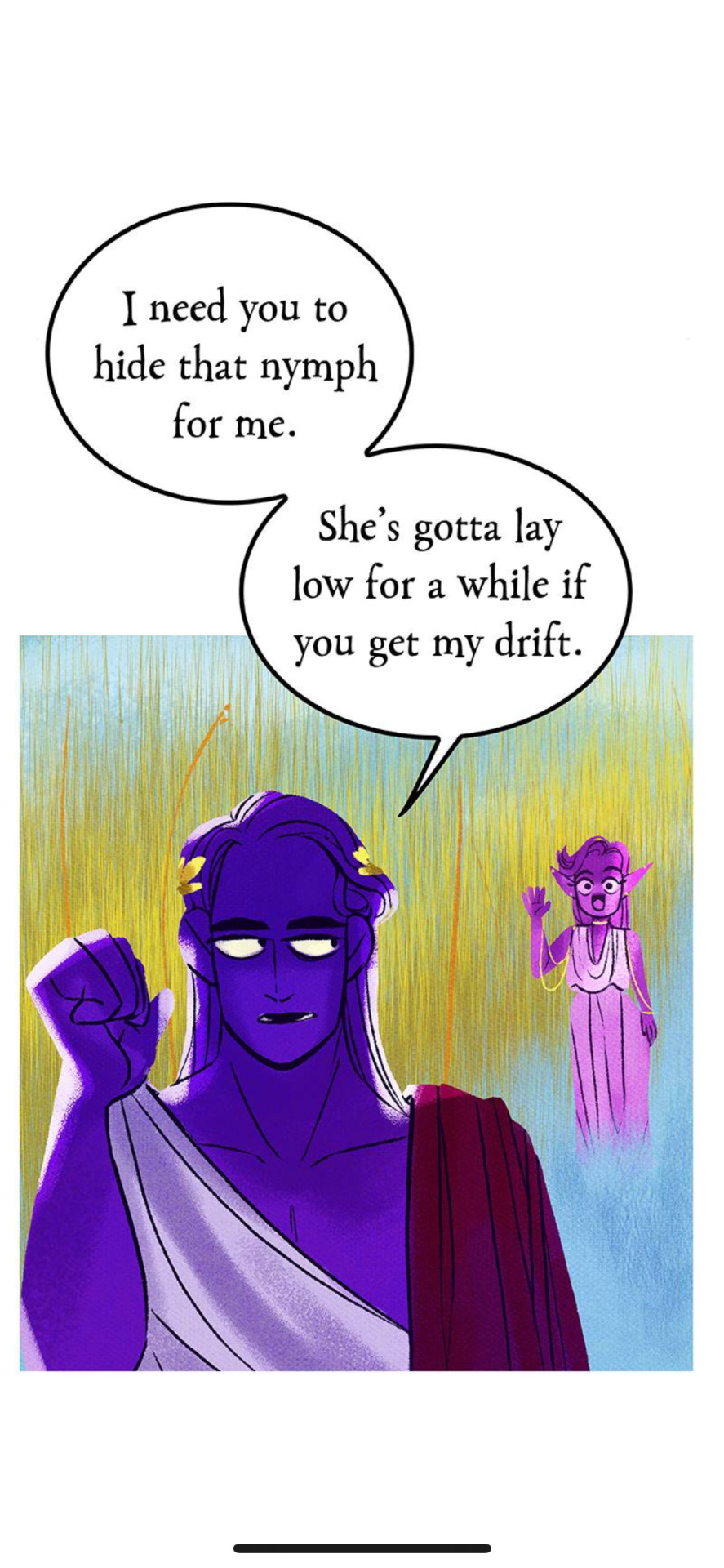
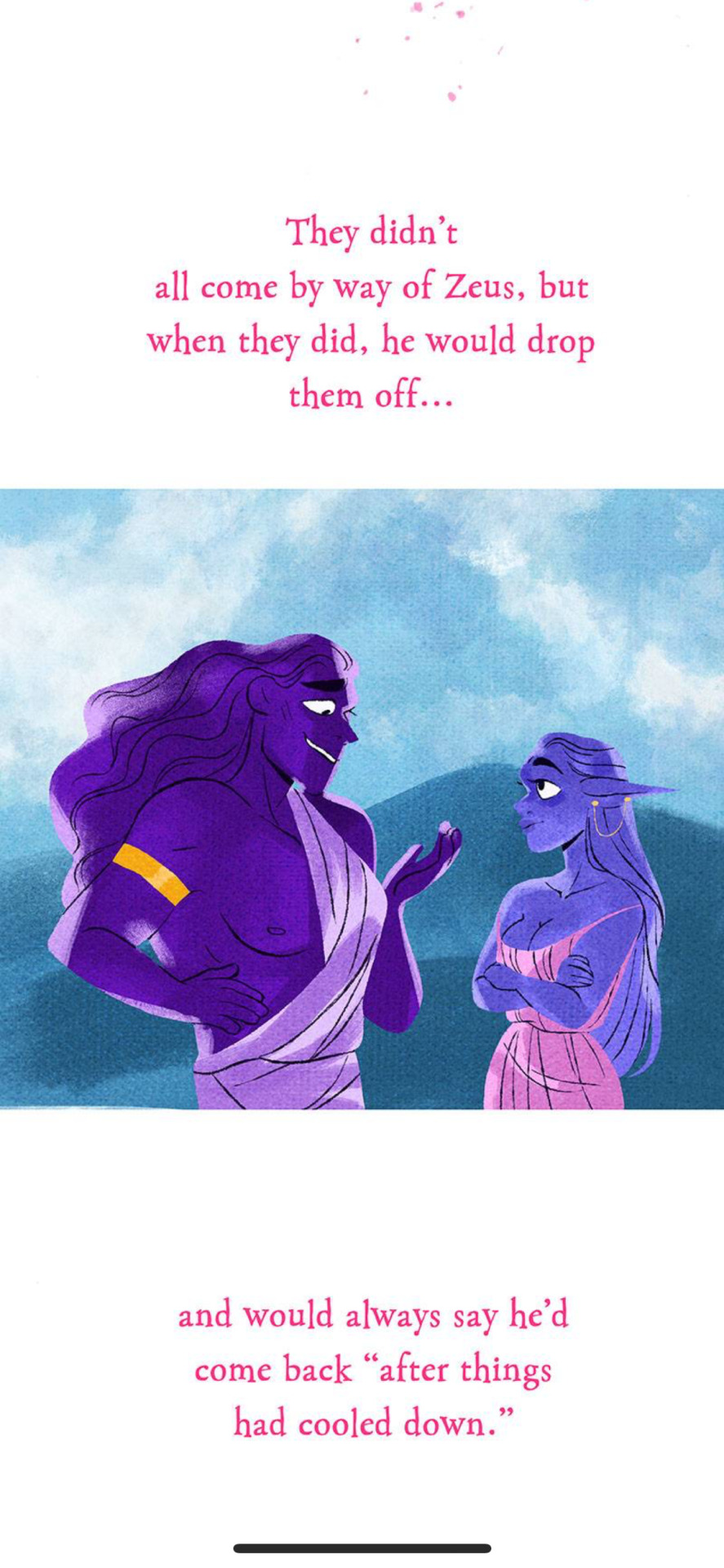
For example, when Persephone finds out Apollo is dating Daphne, she isn't upset he's dating her friend. She's upset he's dating a flower nymph, beings that are generally considered to be "rare", "dumb", and objects of sexual desire. Ew.
Even on the Lore Olympus website (loreolympians.com) nymphs are regarded as "beautiful", "desirable", and "very exotic". And when they're not described in a sexual manner they're say it with me now regarded as "low class" or "workers" for some kind of god/goddess.
Final thoughts
So not only is the characterization of characters like Minthe or Thetis harmful to Greek culture and the stories that are so ingrained in their society, but it is also perpetuating harmful stereotypes about people of color and women who are confident in their sexuality.
Of course, the characters within Greek Mythology had their own issues. Zeus was a serial rapist, many of the goddesses deemed to be "feminist" by today's standards were actually horribly misogynistic looking at you Athena. But 1. that's just how things were back then (but that does not make it right) and 2. all of the good, the bad, and the ugly is still there in Greek Mythology. They're not denying how fucked up it is, but they're also not changing their history to better fit their own narrative or the narrative of the modern world. It exists, it happened, but now it is studied and called out by historians.
Rachel, on the other hand, is doing exactly that. She is actively changing the Greek's cultural history to better fit her fic's narrative. She is constantly sweeping things under the rug or going "No this is how it ACTUALLY happened". Lore Olympus is marketed as a "feminist retelling" yet somehow, it takes allllll the ugly parts from Greek Mythology (rape, incest, problematic age gaps, dubious consent, etc.), mixes it with a majority of the issues we have in the modern world (white feminism, rape-apologists/rape culture, grooming, fetishization of certain minority groups, etc.) and then amplifies the concoction to 20. Lore Olympus cannot be a "progressive, feminist, retelling" and also have characters that are morally apprehensive/come straight from the ancient myths. It does not work. In fact, IMO it makes all the problems from both eras worse.
News flash: actual cultures that are still thriving today are not your toys. They are not "made up". They matter. Do better.
#anti lore olympus#lore olympus#anti lo persephone#anti lo#lore olympus criticism#lore olympus critical#lo critic#lo critical#unpopular lo#unpopular lore olympus#appropriation#greek mythology#if anyone who is actually Greek wants to comment on this or share their thoughts please feel free#I'm not Greek but I have a deep love for mythology/Greek culture so this is just my take on things
526 notes
·
View notes
Text
Those who cannot attack the thought, instead attack the thinker.
Paul Valéry
332 notes
·
View notes
Text
"The Jedi repress their emotions!"
Actually, that's Anakin!
"The Jedi have unhealthy relationships with people!"
Actually, that's Anakin!
"The Jedi are too embroiled in politics to truly be able to help people!"
Anakin is literally in the pocket of the Chancellor and continuously insists that they have to abide by the law while multiple other Jedi, particularly Council members, generally try to avoid that whenever possible in order to better help people on the mission.
"The Jedi aren't involved in politics enough to truly be able to help people!"
Despite living in the Chancellor's pocket, Anakin literally has no idea how the political system works as evidenced by his criticism of it in AOTC and TCW "Heroes on Both Sides." By contrast, we see that Ahsoka has clearly gotten an education in politics and has been taught that it's important to be involved in politics in order to try to keep corruption from happening, an education good enough that she's literally capable of teaching other kids her own age about it. It's also the Jedi who we see actively recognizing that Palpatine is corrupt and choosing the do something about it, unlike Anakin who just keeps making excuses for Palpatine.
"The Jedi didn't fight enough for the clones!"
The Jedi are the ONLY ones we EVER see fighting for the clones in ANY WAY. We see Jedi criticize EACH OTHER for negative treatment of the clones, we see Jedi fight back against the Kaminoans to save the clones, and we see Jedi literally dying to protect the clones. Yoda himself makes the argument to trust the clones after they discover that the clones are probably a Sith trap for the Jedi. There is NO ONE ELSE who ever fights for the clones at all, but the Jedi are seen to do so MULTIPLE TIMES. And I will note that aside from fighting on the battlefield with them, none of these examples include Anakin, who is frequently seen to EXPLOIT his own men, particularly Rex, for his own selfish agendas.
"The Jedi steal babies!"
This has been debunked over and over again by people with more resources than me, but guess who actually DOES steal children? If you guessed Anakin, YOU'D BE RIGHT! And according to the multiple people who gave me examples last time I asked (thank you to all of you who did so), he specifically steals a baby FROM A FORMER JEDI. He also literally helps torture captured Jedi children into becoming Jedi hunters and keeps the body of a Jedi child as a trophy.
#star wars#pro jedi#pro jedi culture#jedi culture respected#jedi appreciation#jedi culture appreciated#jedi respected#anti anakin#anti anakin skywalker#anakin critical#anakin skywalker critical#stop projecting anakin's specific flaws onto the jedi#that's not how media literacy works
1K notes
·
View notes
Link
In his new Longreads essay, Colin Dickey reconsiders the movies Ghost and Ghostbusters, viewing the films through the lens of the pandemic’s influence on New York City.
In Ghost and Ghostbusters, the city and its multitudes are just the backdrop from which the narrow few protagonists emerge. But the reason I’m drawn to ghost stories is precisely because by its very nature the ghost blurs the edges of the individual. It flickers. It is and is not any kind of identity. It is and is not the subject of its own story. There’s possibility there.
Read “Signs of Ghosts” by Colin Dickey at Longreads.
444 notes
·
View notes
Text
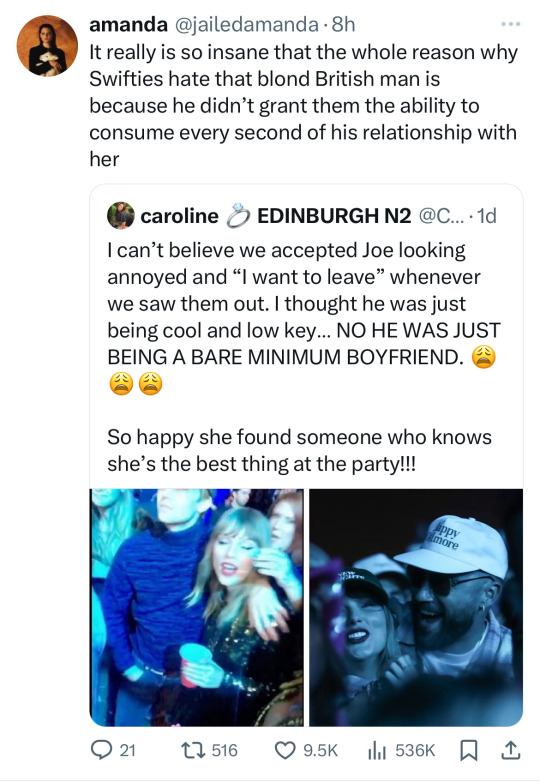
#zero critical thinking skills in this fandom I’m afraid#too many of yall are celebrity worshippers who want tay to interact with her public persona as much as possible#just so that you can consume as much pop culture news as possible#please find other things to be interested in#you don’t have to know every detail of her relationship#y’all hate introverts too and it’s so obvious#your praise her when she valued her privacy and now you look back on that and say she was in jail?#taylor swift#taylorswift#ts#the tortured poets department#ttpd#joe alwyn#swifties#yall need to learn to not place value on superficial Hollywood celebrity gossip
192 notes
·
View notes
Text
Just a heads up about Killers of the Flower Moon
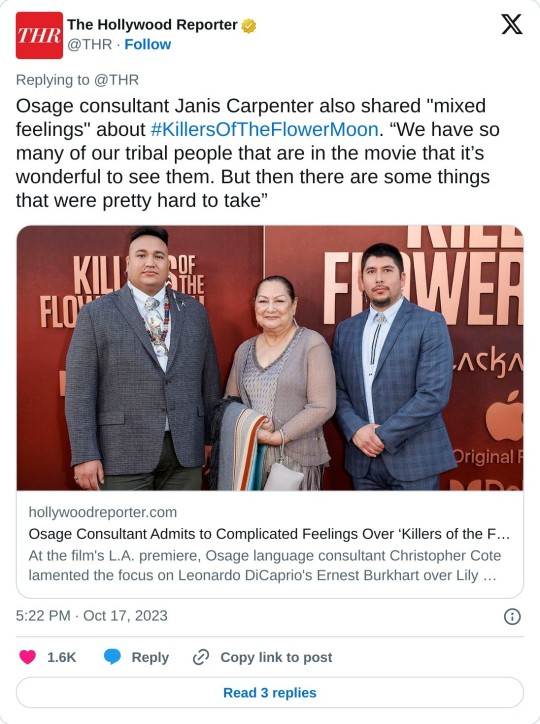
Here Osage language consultant Christopher Cote speaking about this:
#killers of the flower moon#martin scorsese#films#native american#indigenous culture#osage#settler colonialism#anti native racism#historical revisionism#yeah same. i was a little unnerved that it was from the pov of the white criminals#and even made the guy played by dicaprio to be sympathetic#media criticism
447 notes
·
View notes
Text

#radfem safe#radical feminism#radfems please touch#beauty industry critical#diet culture#art#mine#jerusalem cricket#do not read into that it's a cute bug
398 notes
·
View notes
Text
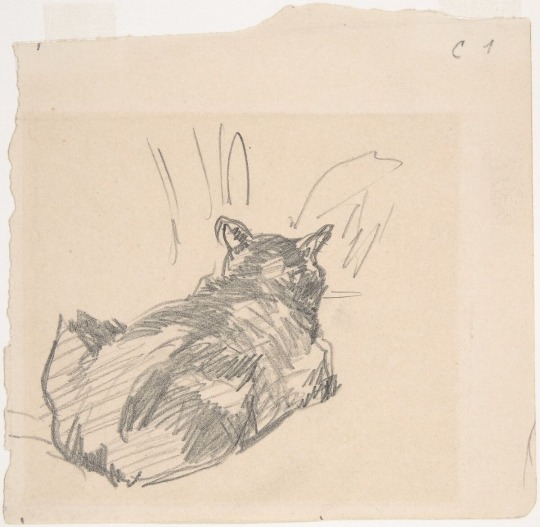
A Cat Resting on All Fours, Seen from Behind. Edouard Manet, 1861. Graphite on paper.
#usually the objective on this blog is critical analysis but the truest function of sketches of cats is just for all of us across time and#culture to go Awwwww Look At Him!#cat#cats#drawing#art history#edouard manet
639 notes
·
View notes